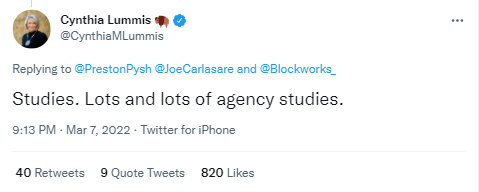The long awaited Executive Order from President Biden is going to be signed today. This is something the cryptocurrency industry speculated would make a major impact. Some even feared that a banning might be on the agenda.
Anyone who was concerned about what Biden would do can breathe a sigh of relief. The Order is really nothing at the end of the day. Those who were hoping for clarity are equally disappointed.
Thus, only those who feel the government has no business involved with cryptocurrency are happy with this Order.

What Is The Government's Next Step?
So where does the United States Government stand on cryptocurrency regulation? The answer is that it truly does not know. That is the reason for the Order.
Biden set out the path to study what should take place. That means there will be research, meetings, and papers written assessing the situation. We are not seeing any regulation nor crackdown.
This is historic, at least according to the Press Release by the government.
Here is how they framed it:
Outlines First Whole-of-Government Strategy to Protect Consumers, Financial Stability, National Security, and Address Climate Risks
That is pretty impressive. The first whole-of-government strategy will garner some attention. Even the title of the fact sheet put out is sounds exciting.

Of course, for those unfamiliar with how governments tend to work. this is normal. They often put together names of bills or actions that sound catchy, like they are designed to help the population. History shows that is not how things typical work out.
Take this one that most Americans know so well:
Uniting and Strengthening America by Providing Appropriate Tools Required to Intercept and Obstruct Terrorism Act
This is known by the more familiar name: PATRIOT Act. It could have been called the "take off your shows and get accosted at the airport act". So do not let the catchy titles fool you.
At the end of the day, anything the US Government is going to do regarding digital assets is leading to its attempt to control. Politicians want to have power over them, just like they do everything else.
For now, this Order does nothing but commission a study. The Fact Sheet did not list the timeframe but earlier reports were there would be a 6 month period to assess and produce the report. After that, another year would be spent looking into the impact upon the climate.
What Does The Industry Need To Do?
Regulation is coming. There is no doubt about it. At some point, the action will turn from study to laws and code dictating what can take place. We already have signs that stablecoins are going to be pushed under the banking laws. It is likely that FDIC will have to be carried, making operation more expansive.
One of cryptocurrency's leading supporters in Congress has this to say about the Order:

Perhaps the Senator believes that the US Government would take a positive tone towards cryptocurrency. Sadly, history does not reveal this to be the case.
For this reason, it is imperative that people involved in cryptocurrency maintain and get back to the original concepts relating to it. Satoshi established the idea of operating outside the scope of government and the financial system. This is something that we need to keep in mind. As long as distributed, open source, and decentralized is behind our actions, the government is truly impotent to do anything.
Over the last few years, we saw the "advancement" of the industry in the direction of Venture Capitalists and Wall Street firms. This is playing right into the government's hands. These entities will adhere to regulation and have the resources to comply. That is not good if the quest for freedom is what we are after.
The Quest For Resiliency
One of the main goals of cryptocurrency is for us to create resiliency against outside attack. This is a process yet one that can take place over time.
The best example of this is Bitcoin. When it started, there was a time when it was likely vulnerable. It was subject to 51% attacks, a concept that is probably long gone for that one. We also might have seen a period where the spread could have been stopped. That idea, too, is history.
We saw China, as well as other countries, crack down on the miners. What happened? Hash rates dropped a great deal. This was only temporary. After that, when miners went online in other locations, the hash rate hit an all time high.
Bitcoin has resiliency. In other words, at this point, it is a DAO that cannot be stopped. It just keeps churning along, 24/7, without interruption. Miners come and go yet the network does nothing more than produce blocks.
What needs to happen is for this to spread across the industry. As many are aware, there is a great deal of centralization taking place. Few projects are set up with the intention of not falling under the umbrella of "centralized". Whether it is due to VC funding or putting together Founder's stake, we see how there are points of vulnerability.
That said, we know many projects are resisting this. At the same time, if we look at things from the collective perspective, we can see how more being built results in a wider spread. The increase in tokens means that wealth is distributed to a much greater degree.
According to the Press Release, we have this:
Surveys suggest that around 16 percent of adult Americans – approximately 40 million people – have invested in, traded, or used cryptocurrencies.
We have roughly 18 months (it is believed) to increase this percent significantly. With growth comes size. This is what the government has to contend with. Not only is the industry getting wealthier each month (we do create our own money after all), there are more people involving themselves.
Hence, the network effect could be incredible. If this number doubles over the next couple years, that makes whatever the government decides to do that much more difficult.
It also builds in a layer of resiliency that helps it withstand attack. Just like Bitcoin expanding to the point where it most likely cannot receive a fatal blow, we need to follow that same path. Growth and expansion make things much harder to take down.
In closing, it is best to state how this just proves our present form of government is woefully inept in dealing with digital matters. It simply moves to slow. We are seeing a lifetime in the digital world being granted. A lot can change in a year and a half. On top of that, even when the reports are produced, then Congress will argue over bills and fight to get the votes.
Essentially, the industry has time to keep advancing at an exponential rate. This is going to show how impotent governments truly are in this matter.
For now, the biggest government in the world wants to look at things for a while longer. That favors the industry enormously.
If you found this article informative, please give an upvote and rehive.

gif by @doze

logo by @st8z
Posted Using LeoFinance Beta


